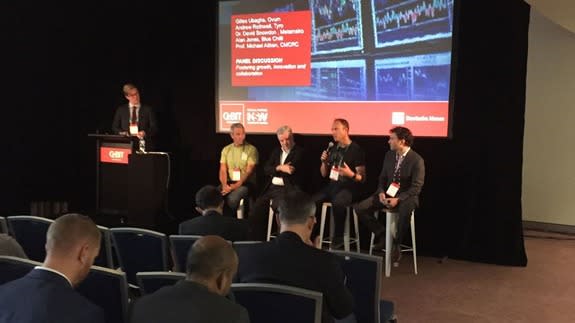White, old man offers tech panel seat to anyone who isn't white, old man

Ever since Facebook was a mere twinkle in Mark Zuckberg's eye, all-white, all-male panels at startup conferences have been the deplorable status quo.
On Monday morning, Alan Jones, startup evangelist at the Sydney accelerator BlueChilli, was set to speak on a fintech panel at the CeBIT technology conference in Sydney. That was until he checked out his co-panellists. Their blinding similarity — old, male, white — was dismaying, so he put out the call on Twitter to find himself a more diverse replacement.
Speaking with Mashable Australia before the panel, Jones, who hadn't yet found a stand-in, said the situation was very familiar and very disappointing.
As an experienced tech conference panelist, he explained his theory about how on earth this can keep happening. "Underlying everything, when you are putting together a conference, your primary focus is your keynote," he said. "Usually, you're trying as hard as you can to secure some big names from overseas. That's the primary goal. Diversity sits well down the list of goals."
In the hierarchy of how large technology conferences are structured, he suggested panels were the lowest rung for organisers. "You put panels on to include stakeholders — they may be sponsors or have a big booth at the event. Then you've probably got some vacant seats, so that's when you turn to me," he laughed.
Supporting diversity in technology plays a part in his agenda at BlueChilli, Jones said. Nevertheless, he decides how to deal with all-white, all-males panels on a case-by-case basis. "I would have done a bit better with this one if I had looked at the panel before this morning," he explained. "Usually I look earlier and send some emails."
As a representative of BlueChilli, however, he said he's not in a position to give up his seat entirely. "My only way of marketing BlueChilli is through non-cash means, so we need to be on those panels," he explained. "I just know how many successful, powerful women deserve that voice."

Image: cebit
Ultimately, no woman replaced Jones on the panel. He still managed to bring the issue up, however, throwing his opportunity to answer the moderator's first few questions to any woman in the audience who wished to speak.
Unfortunately, there were about five women in the room available to take up his offer out of around 30 attendees. Louise Long, head of human-centred design at NABLabs at the National Australia Bank, who was chairing the afternoon's fintech talks, thanked Jones for bringing up the elephant in the room.
A CeBIT spokesperson told Mashable Australia there was no prescribed allocation for gender, race, or specific diversity by the organisers of the show. "This year as always, speakers (including panelists) are sourced from all over the world, and the only criteria is that they are the best and brightest in their field of expertise," she said.
The endemic lack of speaker diversity at conferences has been back in the news lately, with five of Australia's most popular male conference speakers declaring they would boycott panels that did not include women, according to Fairfax Media.
The five, including Adam Fraser, Jason Fox, Dan Gregory, Matt Church and Darren Hill, who have expertise that ranges from motivational speaking to business advice, told the publication they will no longer participate in or moderate panels that don't ensure better representation.
"There are plenty of women who are experts in their field and highly talented speakers," Gregory said "And, to steal a line from Canadian Prime Minister Justin Trudeau, 'it's 2016'. The thing is, research tells us diversity makes groups smarter, so why are we dumbing panels down?"
As for Jones, he's going to keep bringing the issue up, whether it makes for an awkward panel discussion or not. "I'm sad that I'm now becoming an old white man, but I'm not going to stand by and let it happen," he laughed.
UPDATE: May 3, 2016, 1:07 p.m. AEST CeBIT statement added.
